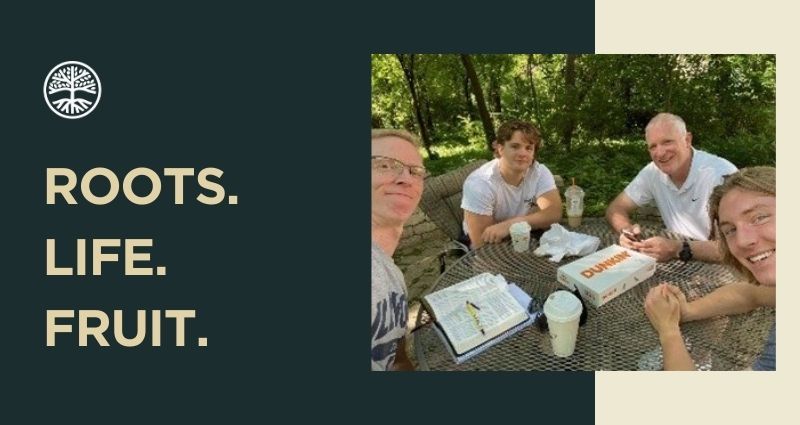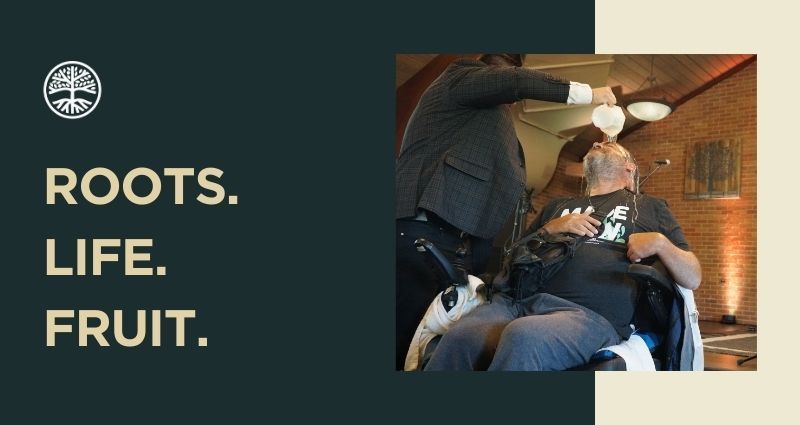Share this Article:
Written by: The Orchard

Understanding the Meaning of Forgiveness
Forgiveness in the Bible reflects the heart of God. It means to no longer hold sin against the person who has sinned against you. It’s not about forgetting what happened or pretending it didn’t hurt, it’s a choice to respond in mercy rather than revenge. In Jesus’ own words, this idea is woven into how He teaches His followers to pray: “and forgive us our debts, as we also have forgiven our debtors.” Forgiveness, then, is not only something to receive but something to extend.
That short line reveals something significant, it connects our relationship with God to the way we relate to others. It places personal forgiveness and relational healing in the same breath. Forgiveness interrupts the cycle of bitterness and gives way to peace, healing, and humility. In the biblical story, forgiveness is never a small moment. It’s a reflection of God’s character and a call to live in step with His grace.
Why Forgiveness Matters to Christians
Forgiveness matters because it lies at the center of the cross. In His final hours, Jesus looked upon those who condemned Him and said, “Father, forgive them.” His death and suffering was the greatest expression of mercy the world has ever known. Through Christ’s sacrifice, God offers full forgiveness to those who trust in Him, washing away guilt and reconciling broken people to Himself.
Coming out of the Easter season, Christians are reminded that grace is more than something we believe. It’s a gift that changes everything. It lifts the weight of shame and restores the relationship that sin tried to sever between us and our Father in heaven.
However, that kind of forgiveness isn’t meant to stop with us. God calls us to pass it on. Because Jesus gave up His life for us, we learn to let go of pride and show that same grace to others. Forgiveness is not just something we receive from others, it’s something we’re called to share with others. Forgiveness is part of the resurrection story still unfolding in our lives today. Shaping our words, our reactions, and our willingness to extend grace in how we treat one another every day.
Forgiveness in the Bible: Key Teachings and Examples
Foundations of Forgiveness
From the earliest pages of Scripture, forgiveness is shown as both a command and a calling. In Leviticus 19:18, God tells His people not to seek revenge but to love their neighbor, pointing toward a deeper way of living marked by mercy. The Psalms point to the beauty of God’s grace, reminding us that He “removes our transgressions” far from us (Psalm 103:12), offering healing where sin once divided.
“You shall not take vengeance or bear a grudge against the sons of your own people, but you shall love your neighbor as yourself: I am the Lord.”
One of the clearest human examples comes from the life of Joseph (Genesis 50:15–21). As a teenager, Joseph was sold into slavery by his own brothers, who were driven by jealousy and spite. He was taken to Egypt, wrongly accused, and imprisoned for years. But through God’s providence, Joseph eventually rose to a position of power, second only to Pharaoh.
When a famine brought his brothers to Egypt seeking help, Joseph recognized them immediately. They didn’t recognize him. After testing their hearts, Joseph finally revealed his identity. Instead of punishing them, he chose forgiveness. “You meant evil against me,” he said, “but God meant it for good” (Genesis 50:20). His words weren’t just a release of anger; they were an act of deep faith. That kind of grace can only come from someone whose heart has been shaped by trust in God’s bigger plan.
Jesus’ Teachings on Forgiveness
Jesus made forgiveness the center of discipleship. In the Sermon on the Mount, He taught plainly that our relationship with God is connected to how we treat others: “For if you forgive others their trespasses, your heavenly Father will also forgive you” (Matthew 6:14–15). Showing that forgiveness may begin as kindness, but it grows from grace.
Later, Peter came to Jesus with a question: “Lord, how often will my brother sin against me, and I forgive him? As many as seven times?” (Matthew 18:21). Jesus answered, “I do not say to you seven times, but seventy-seven times” (Matthew 18:22). His answer pointed not to a number, but to a lifestyle.
To drive the point home, Jesus told a story about a servant who was forgiven a massive debt, only to turn around and refuse forgiveness to someone who owed him a small amount (Matthew 18:23–35). The parable reveals a hard truth: we can’t truly grasp God’s mercy while holding a grudge against someone else. Forgiveness, then, wasn’t presented as a concept to agree with; it was woven into how God invites us to live in relationship with Him and others.
The Forgiveness of Stephen in the Early Church
After Jesus' death, forgiveness took a deeper root in the early church, not as a new concept but as a way of life shaped by His teaching, His sacrifice, and His resurrection. One of the clearest examples is found in Acts 7, in the story of Stephen, a bold witness for Christ.
Stephen had been preaching about Jesus, and for that, he was dragged outside the city and stoned. In the middle of the chaos, as stones were hurled and hatred surrounded him, Stephen prayed, “Lord, do not hold this sin against them” (Acts 7:60). His final words echoed the forgiveness Jesus showed at the cross.
Most people in Stephen’s place might have shouted in anger or demanded justice. But Stephen responded differently. He forgave. Not because he was fearless, but because the gospel had changed him from the inside out. His heart had been formed by the grace of Jesus, and it shaped the way he faced death. Stephen wasn’t ignoring the wrong done to him. He was entrusting it to God.
That kind of forgiveness doesn’t come naturally. It’s the fruit of a life led by the Spirit of Christ. It shows that the story of grace didn’t end at the resurrection. It keeps unfolding through the lives of those who follow Him.
The Spiritual and Emotional Benefits of Forgiveness
Freedom from Destructive Emotions
Some emotions settle in when we’ve been wronged. Holding on to bitterness, resentment, or anger may feel justified in the moment, but over time, those emotions take root and begin to shape how we think, speak, and act. In
Ephesians 4:31–32, Paul encourages believers to “put away all bitterness and wrath and anger... be kind to one another, tenderhearted, forgiving one another, as God in Christ forgave you.” Forgiveness breaks the cycle of destructive emotions. It gives space for peace to settle in where hostility once lived. And it allows us to move forward in freedom, rather than staying stuck in the hurt.

Healing Through Forgiveness
Forgiveness doesn’t erase the past, but invites God’s power to bring healing to it. Relationships are often where wounds are made, but they are also where God works to restore.
Colossians 3:13 calls believers to “bear with one another and, if one has a complaint against another, forgive each other; as the Lord has forgiven you, so you also must forgive.” When we extend forgiveness, we open the door to healing for ourselves and the one who wronged us. It’s a choice that invites restoration, even if reconciliation takes time.
Forgiveness and Spiritual Growth
Learning to forgive draws us closer to the heart of God. Every time we release an offense, we’re choosing to trust God’s justice more than our own. Forgiveness requires humility, patience, and faith. These qualities grow over time
through the work of the Holy Spirit. The more we practice forgiveness, the more we begin to reflect the character of Christ. We will display soft hearts, dependency on God, and a life of sacrifice in loving others.
How to Practice Forgiveness
According to the Bible
While the Bible calls us to forgive those who wrong us, it also reminds us that God forgives us… completely and without hesitation, even when we hesitate to believe it. When we’ve hurt someone, failed to live up to our values, or fallen short of God’s standard, the weight of guilt can settle in deeply.
The Bible speaks directly to this kind of burden. In 1 John 1:9, we’re reminded that when we honestly bring our sins before God, He responds with both faithfulness and justice. This promise isn’t partial or reserved for certain situations either. It’s full, complete, and rooted in God’s character.
“If we confess our sins, he is faithful and just to forgive us our sins and to cleanse us from all unrighteousness.”
Walking in that kind of forgiveness means trusting that what God says is true. If He has forgiven us through Christ, we don’t need to keep carrying what He’s already lifted. Practicing forgiveness, then, begins by confessing our sin, receiving God’s mercy, and choosing to live in the freedom He offers.
That freedom overflows into our relationships. Forgiveness doesn’t always come easily, and it may not happen all at once. But as we pray, reflect on God’s Word, and stay open to the Spirit’s work, we grow in our ability to release resentment, pursue peace, and reflect the grace we’ve received. Forgiveness becomes part of our rhythm, something we learn to practice again and again.
Grow Together in the Journey of Forgiveness
God doesn’t rush forgiveness in us. He shapes it patiently, through grace and practice, as we learn to follow Him more closely. Through the pages of Scripture, we see what forgiveness looks like in real lives, in real pain, and in real healing. We see a God who removes the weight of sin, who calls us to let go of bitterness, and who invites us to live in freedom.
Forgiveness restores what sin tries to destroy. It mends relationships, softens hearts, and draws us deeper into the grace of Jesus.
But no one walks this path perfectly or alone. That’s why God places us in community. At The Orchard, we believe that growth happens best together. Whether it’s through studying the Bible, praying alongside others, or finding support in LIFE Groups, we want to be a place where forgiveness is taught and lived.
If you’re carrying the weight of something, or simply want to grow in how you extend grace to others, we invite you to take a step.
Join us on a weekend, reach out to a pastor, or
explore what it looks like to walk in freedom through Christ. There’s always
a next step in the journey, and
we’d love to take it with you.
Connect with Us:




